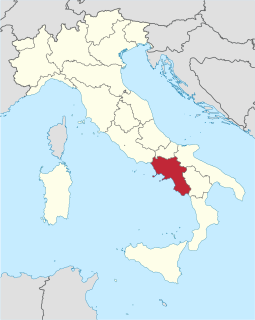
Campania is an administrative region of Italy. Located on the south-western portion of the Italian Peninsula, with the Tyrrhenian Sea to the west, it includes the small Phlegraean Islands and Capri for administration as part of the region. As of 2018, the region has a population of around 5,820,000 people, making it the third-most-populous region in the country; its total area of 13,590 km2 (5,247 sq mi) makes it the most densely populated region in Italy. Campania is the most productive region in southern Italy by GDP, with Naples' urban area being the 7th-most populous in the European Union. The region is home to 10 of the 55 UNESCO sites in Italy, like Pompeii and Herculaneum, the Royal Palace of Caserta, the Amalfi Coast and the Historic Centre of Naples. Moreover, Mount Vesuvius is part of the UNESCO World Network of Biosphere Reserves.

Naples is the regional capital of Campania and the third-largest city of Italy, after Rome and Milan, with a population of 967,069 within the city's administrative limits as of 2017. Its province-level municipality is the third-most populous metropolitan city in Italy with a population of 3,115,320 residents, and its metropolitan area is the second-most populous metropolitan area in Italy and the 7th-most populous urban area in the European Union.

Neapolitan is a Romance language of the Italo-Dalmatian group spoken across much of southern Italy, except for southern Calabria, southern Apulia, and Sicily, and spoken in a small part of central Italy. It is named after the Kingdom of Naples that once covered most of the area, of which the city of Naples was the capital. On October 14, 2008, a law by the Region of Campania stated that Neapolitan was to be protected.
"Caruso" is a song written by Italian singer-songwriter Lucio Dalla in 1986. It is dedicated to Enrico Caruso, an Italian tenor. Following Lucio Dalla's death, the song entered the Italian Singles Chart, peaking at number two for two consecutive weeks. The single was also certified platinum by the Federation of the Italian Music Industry.

Pizza Margherita is a typical Neapolitan pizza, made with San Marzano tomatoes, mozzarella cheese, fresh basil, salt and extra-virgin olive oil.
The Neapolitan Republic was a republic created in Naples, which lasted from 22 October 1647 to 5 April 1648. It began after the successful revolt led by Masaniello and Giulio Genoino against King Philip III and his viceroys.

Pino Daniele was an Italian singer-songwriter, and guitarist, whose influences covered a wide number of genres, including pop, blues, jazz, and Italian and Middle Eastern music.
Naples has played an important and vibrant role over the centuries not just in the music of Italy, but in the general history of western European musical traditions. This influence extends from the early music conservatories in the 16th century through the music of Alessandro Scarlatti during the Baroque period and the comic operas of Pergolesi, Piccinni and, eventually, Rossini and Mozart. The vitality of Neapolitan popular music from the late 19th century has made such songs as 'O Sole mio and Funiculì Funiculà a permanent part of our musical consciousness.
Canzone napoletana, sometimes referred to as Neapolitan song, is a generic term for a traditional form of music sung in the Neapolitan language, ordinarily for the male voice singing solo, although well represented by female soloists as well, and expressed in familiar genres such as the love song and serenade. Many of the songs are about the nostalgic longing for Naples as it once was. The genre consists of a large body of composed popular music—such songs as "’O sole mio"; "Torna a Surriento"; "Funiculì, Funiculà"; "Santa Lucia" and others.
Vincenzo Cuoco was an Italian writer. He is mainly remembered for his Saggio Storico sulla Rivoluzione Napoletana del 1799. He is a considered one of the precursors of Italian liberalism and the realist school. Cuoco adapted the critique of political rationalism of Edmund Burke and Joseph de Maistre for liberal ends, and has been described as a better historian than either of them. He influenced many subsequent Italian intellectuals, from Ugo Foscolo and Alessandro Manzoni to Bertrando and Silvio Spaventa to Benedetto Croce and Antonio Gramsci.

Tony Tammaro, stage name of Vincenzo Sarnelli, is an Italian parody singer/songwriter. The main theme of Tammaro's lyrics are "tamarri", a term taken from Neapolitan dialect, which indicates someone who is vulgar, miseducated, and often boasting a flourishing behaviour. The term could also be translated as "rednecks", to indicate its derogatory nature; however, it presents no connections with the original term in regards of its rural background. In his songs, Tammaro uses irony to describe the "tamarri", from which his own stage name is derived.
"Torna a Surriento" is a Neapolitan song composed in 1894 by Italian musician Ernesto De Curtis to words by his brother, the poet and painter Giambattista De Curtis. The song was copyrighted officially in 1905, and has become one of the most popular songs of this traditional genre, which include others such as "'O sole mio", "Funiculì funiculà", and "Santa Lucia".

Teresa De Sio is an Italian pop-folk singer and songwriter. She is the elder sister of actress Giuliana De Sio.
Guappo is a historical Southern Italian criminal subculture and informal term of address in the Neapolitan language, roughly analogous to or meaning thug, swaggerer, pimp, braggart, or ruffian. While today the word is often used to indicate a member of the Camorra, a Mafia-type organisation in the region of Campania and its capital Naples in Italy, the guapperia predates the modern Camorra and was originally a different and separate criminal subculture that considered itself very much independent of the Camorra.

Femminielli or femmenielli is a term used to refer to a population of people who embody a third gender role in traditional Neapolitan culture. It may be hard to define this term within modern Western notions of "gay men" versus "trans women" since both these categories overlap to a degree in the case of femminielli. This term is not derogatory and does not carry a stigma; instead femminielli are traditionally believed to bring luck. Ironically, Achille della Ragione suggests that recent surveys have shown that Neapolitans have a generally negative view of what he calls "the politically correct model of homosexuality of a hypocritical do-gooder society", yet he contrasts femminielli as enjoying a favorable attitude from a part of Neapolitan society.

The sceneggiata or sceneggiata napoletana is a form of musical drama typical of Naples. Beginning as a form of musical theatre after World War I, it was also adapted for cinema; sceneggiata films became especially popular in the 1970s, and contributed to the genre becoming more widely known outside Naples.
Neomelodic music, or musica neomelodica, is a musical style originating from the Italian city of Naples.

Sergio Bruni was a popular Italian singer, guitarist, and songwriter. He was often called "The Voice of Naples".

Roberto Murolo was an Italian musician.

Alessandro Siani is an Italian actor, director, screenwriter and stand-up comedian.













